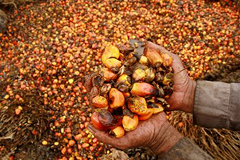Indonesia vows to fight EU over palm oil limits
15/07/2019 12:00

Indonesia’s president, Joko Widodo, has vowed to fight the European Union over plans to restrict the use of palm oil in biofuels as the bloc looks to limit the materials that can be regarded as renewable energy sources.
Brussels has set a 2030 limit for phasing out palm oil, which is blamed for driving rare species to extinction, deforestation and climate change.
There is an 85-per-cent loss of biodiversity in an ecosystem when plantations are created from the world’s most biodiverse ecosystems. Orangutans, tigers, rhinos and elephants are losing their habitats and becoming increasingly endangered or extinct.
The EU in June pushed for restrictions on the use of palm oil in biofuel, prompting Indonesia and Malaysia, the largest producers, to say the claims were misleading and detrimental to millions of Asean citizens.
The world’s two biggest producers, Indonesia and Malaysia, are dependent on the versatile product, which is used in a wide range of products foods and cosmetics.
Together the two countries produce about 85 per cent of the world’s palm oil.
Rainforest and peatland are cut and burned to create plantations. Peat is extremely rich in carbon so when it is burned stored carbon is released into the atmosphere. Indonesia produces the third-highest greenhouse-gas emissions after China and the US.
“Jokowi”, as the president is commonly known, said he was determined to get the EU to change its rules.
“For me, if there is discrimination like that, I will fight because of the 16 million farmers and workers in this business,” the newly re-elected president said. “Palm oil is a strategic commodity for Indonesia and since the very beginning, Indonesia has said ‘let us compare our scientific data’,” Jokowi told Blommberg.
The wider palm oil sector contributes around 3.5 per cent to Indonesian GDP and sustains an estimated 6 per cent of the population.
The Indonesian government last year earned US$17.8 billion from exports of the oil.
Palm oil company shares have fallen 9 per cent this year amid anxiety about the EU restrictions and both Indonesia and Malaysia have threatened retaliation.
Jokowi, who will be sworn in for a second term in October, said his re-election gave him the mandate to bolster Indonesia’s economy, including lowering corporate taxes, easing labour laws and lifting restrictions on foreign ownership.
“I know better the problems,” Jokowi said. “Because this is my last term, so I have no burden. I have nothing to lose.”
Brussels has set a 2030 limit for phasing out palm oil, which is blamed for driving rare species to extinction, deforestation and climate change.
There is an 85-per-cent loss of biodiversity in an ecosystem when plantations are created from the world’s most biodiverse ecosystems. Orangutans, tigers, rhinos and elephants are losing their habitats and becoming increasingly endangered or extinct.
The EU in June pushed for restrictions on the use of palm oil in biofuel, prompting Indonesia and Malaysia, the largest producers, to say the claims were misleading and detrimental to millions of Asean citizens.
The world’s two biggest producers, Indonesia and Malaysia, are dependent on the versatile product, which is used in a wide range of products foods and cosmetics.
Together the two countries produce about 85 per cent of the world’s palm oil.
Rainforest and peatland are cut and burned to create plantations. Peat is extremely rich in carbon so when it is burned stored carbon is released into the atmosphere. Indonesia produces the third-highest greenhouse-gas emissions after China and the US.
“Jokowi”, as the president is commonly known, said he was determined to get the EU to change its rules.
“For me, if there is discrimination like that, I will fight because of the 16 million farmers and workers in this business,” the newly re-elected president said. “Palm oil is a strategic commodity for Indonesia and since the very beginning, Indonesia has said ‘let us compare our scientific data’,” Jokowi told Blommberg.
The wider palm oil sector contributes around 3.5 per cent to Indonesian GDP and sustains an estimated 6 per cent of the population.
The Indonesian government last year earned US$17.8 billion from exports of the oil.
Palm oil company shares have fallen 9 per cent this year amid anxiety about the EU restrictions and both Indonesia and Malaysia have threatened retaliation.
Jokowi, who will be sworn in for a second term in October, said his re-election gave him the mandate to bolster Indonesia’s economy, including lowering corporate taxes, easing labour laws and lifting restrictions on foreign ownership.
“I know better the problems,” Jokowi said. “Because this is my last term, so I have no burden. I have nothing to lose.”
Course: Asean Economist
Các tin khác
- Textile and garment exports recovered positively (19/04/2024)
- Foreign steel imported en masse, manufacturers call for protection (19/04/2024)
- US targets Chinese steel with 'overcapacity' fallacy amid escalating trade tensions; move casts great uncertainty on stabilizing bilateral ties (19/04/2024)
- Thailand is considering implementing protective tariffs on imports from China (19/04/2024)
- Fruit and vegetable exports to RoK and Thailand surge (19/04/2024)
 Home
Home
 About Us
About Us




















